Tuesday, 2025-10-21, 5:19 PM
Welcome Guest |
|
|
Publisher
Paavo Nurmi
Paavo Nurmi (13 June 1897 – 2 October 1973) of Finland tops all track stars of the modern age in terms of Olympic medals; 12 medals: 9 of them were gold and 3 were silver and 31 world records in th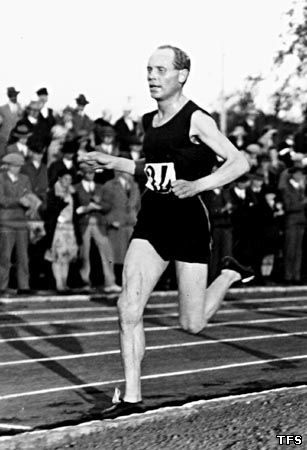 e 12 events in which he competed at the Olympic Games from 1920 to 1928. In 1932, Nurmi was unable to compete at the Olympics, as he had received money for his running and was thus considered a professional. Born in Turku in 1897 the 'Phantom Finn' dominated middle/long distance running in the Twenties and was a living legend by the time he retired, at the age of 37. e 12 events in which he competed at the Olympic Games from 1920 to 1928. In 1932, Nurmi was unable to compete at the Olympics, as he had received money for his running and was thus considered a professional. Born in Turku in 1897 the 'Phantom Finn' dominated middle/long distance running in the Twenties and was a living legend by the time he retired, at the age of 37.
In 1920 Summer Olympic, he competed in four events. He won three gold medals: the 10 000m, the cross country event and the cross country team event, and finished second in the 5000m.
A taciturn, hard-working man, Nurmi had his brightest days at the Paris Olympics of 1924. There, despite the sultry climate, a far cry from the cool temperatures he was used to in Finland, Nurmi collected five gold medals in five events: he won the 1500m in 3:53.6, then the 5000m in 14:31.2 with only 26 minutes between the final races. In the shorter race (1500m), he killed the opposition with a hot early pace (800m in 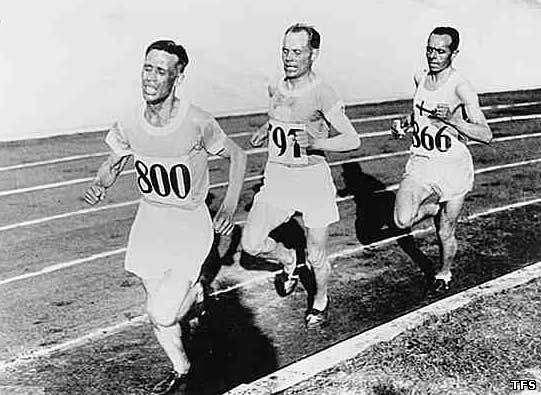 1:58.5), with one lap of a 500m track to go, Nurmi had the race won - that is when he threw his famous watch onto the grass and went on to win with ease. In the 5000m Nurmi had two strong rivals: Ville Ritola the Finnish one (he was known as one of the "Flying Finns”, with Paavo Nurmi and Hannes Kolehmainen), and his second rival was Edvin Wide of Sweden, who tried to break him with a fast pace. Nurmi was content to follow them 40 meters behind, checking his pace with his watch until he caught them up as they faded. He finally won from Ritola. Mind you, this ordeal was not new to him: three weeks earlier, on the cinders of the Zoological Gardens in Helsinki, he conducted a dress rehearsal under better climatic conditions and set two world records in the space of an hour: 3:52.6 for the 1500m and 14:28.2 for 5000m. He also had broken the world record in both of these events earlier the same year, the 3000m team race, and again both cross country events. It was the last time these cross country events were held, as t 1:58.5), with one lap of a 500m track to go, Nurmi had the race won - that is when he threw his famous watch onto the grass and went on to win with ease. In the 5000m Nurmi had two strong rivals: Ville Ritola the Finnish one (he was known as one of the "Flying Finns”, with Paavo Nurmi and Hannes Kolehmainen), and his second rival was Edvin Wide of Sweden, who tried to break him with a fast pace. Nurmi was content to follow them 40 meters behind, checking his pace with his watch until he caught them up as they faded. He finally won from Ritola. Mind you, this ordeal was not new to him: three weeks earlier, on the cinders of the Zoological Gardens in Helsinki, he conducted a dress rehearsal under better climatic conditions and set two world records in the space of an hour: 3:52.6 for the 1500m and 14:28.2 for 5000m. He also had broken the world record in both of these events earlier the same year, the 3000m team race, and again both cross country events. It was the last time these cross country events were held, as t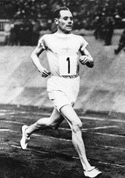 he great heat caused more than half of the competitors to abandon the race, and many more had to be taken to hospital. Finnish officials, fearing for his health, refused to enter Nurmi in the 10,000m event. Thus, he was unable to defend his title. An angry Nurmi protested after returning to Finland by setting a new world record in the 10,000m that would last for almost 13 years. he great heat caused more than half of the competitors to abandon the race, and many more had to be taken to hospital. Finnish officials, fearing for his health, refused to enter Nurmi in the 10,000m event. Thus, he was unable to defend his title. An angry Nurmi protested after returning to Finland by setting a new world record in the 10,000m that would last for almost 13 years.
Nurmi ended his Olympic career at the 1928 Summer Olympics, winning the 10 000 m and two silver medals: 5000m and 3000m steeplechase.
Nurmi has won the most Olympic medals in Track & Field, 12 totals. He ties Larissa Latynina, Mark Spirtz, and Carl Lewis with nine Olympic gold medals, second only to Micheal Phelps with fourteen. Due to this fact, he is often considered the greatest Track & Field athlete of all time.
During his competitive running career, which lasted from about 1919 to 1934, Nurmi earned a reputation for speaking very little off the track. An illustration of this was his two-word reply to a congra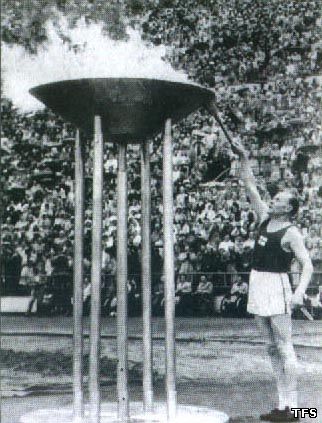 tulatory speech during his 1925 tour of the United States: "Thank you!". In contrast to another famous early 20th-century Finnish Olympic running champion, Hannes Kolehmainen, he also rarely smiled in public. tulatory speech during his 1925 tour of the United States: "Thank you!". In contrast to another famous early 20th-century Finnish Olympic running champion, Hannes Kolehmainen, he also rarely smiled in public.
Nurmi did travel to Los Angeles and kept training at the Olympic Village. Despite pleas from all the entrants of the marathon, Nurmi was not allowed to compete at the Games. A Finnish national hero, Paavo Nurmi was the lighter of the Olympic Flame at the 1952 Summer Olympics in Helsinki.
In 1961, a team of students at the Helsinki University of Technology smuggled a statue of Nurmi in front of the Helsinki Olympic Stadium. Nurmi died in 1973 in Helsinki and was given a state funeral.
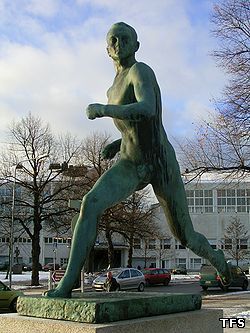
Quote:
Mind is everything. Muscles are pieces of rubber. All that I am, I am because of my mind.
|
| Category: Legends | Added by: krystel (2010-08-30)
|
| Views: 5516 | Comments: 2
| Rating: 5.0/3 |
Recommend Entry to a Friend:
|
| | Total comments: 0 | |
|
|
|
|
|
|

| Our Partner
|
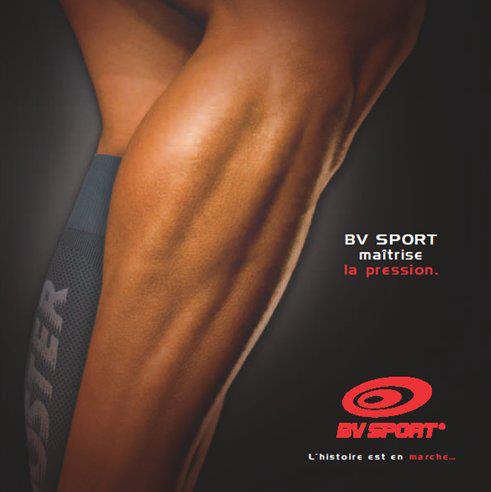
|
|
| Statistics |
Total online: 1 Guests: 1 Users: 0 |
|
|

